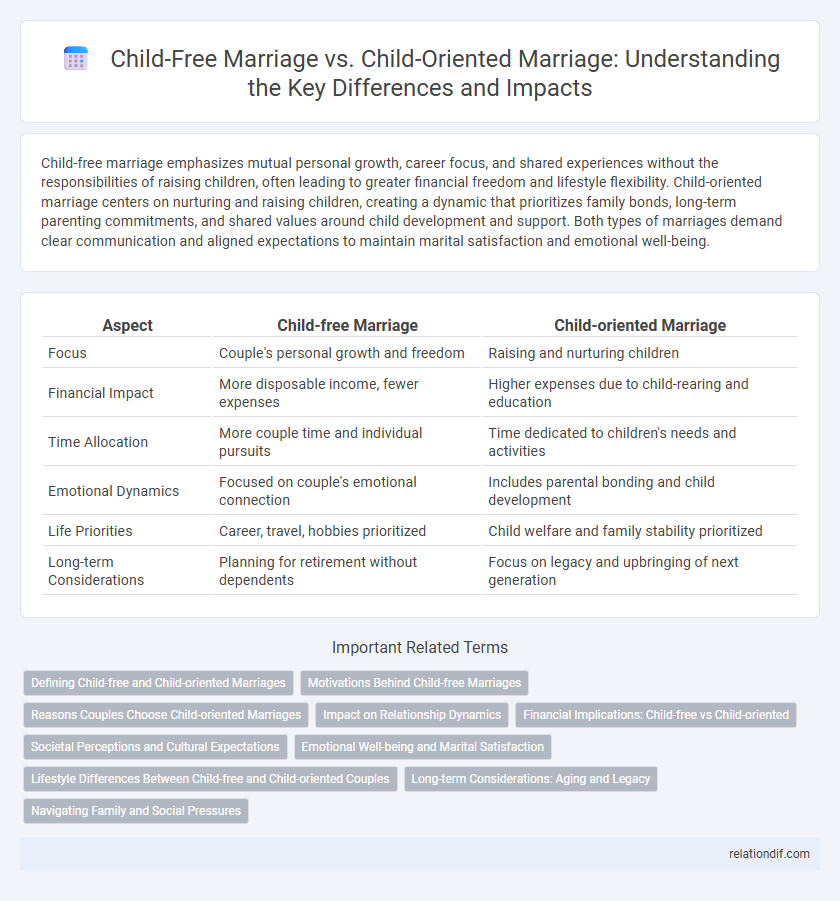Child-free marriage emphasizes mutual personal growth, career focus, and shared experiences without the responsibilities of raising children, often leading to greater financial freedom and lifestyle flexibility. Child-oriented marriage centers on nurturing and raising children, creating a dynamic that prioritizes family bonds, long-term parenting commitments, and shared values around child development and support. Both types of marriages demand clear communication and aligned expectations to maintain marital satisfaction and emotional well-being.
Table of Comparison
| Aspect | Child-free Marriage | Child-oriented Marriage |
|---|---|---|
| Focus | Couple's personal growth and freedom | Raising and nurturing children |
| Financial Impact | More disposable income, fewer expenses | Higher expenses due to child-rearing and education |
| Time Allocation | More couple time and individual pursuits | Time dedicated to children's needs and activities |
| Emotional Dynamics | Focused on couple's emotional connection | Includes parental bonding and child development |
| Life Priorities | Career, travel, hobbies prioritized | Child welfare and family stability prioritized |
| Long-term Considerations | Planning for retirement without dependents | Focus on legacy and upbringing of next generation |
Defining Child-free and Child-oriented Marriages
Child-free marriage refers to a marital relationship where partners consciously choose not to have children, prioritizing personal goals, careers, and lifestyle preferences instead. In contrast, child-oriented marriage centers on raising children as a fundamental aspect of the union, with spouses focusing on parenting responsibilities and family growth. These distinct approaches shape marital dynamics, communication, and long-term planning based on differing values regarding procreation and family structure.
Motivations Behind Child-free Marriages
Child-free marriages are often motivated by personal freedom, career focus, and environmental concerns, reflecting a conscious choice to prioritize individual goals and lifestyle preferences over traditional family structures. Many couples in child-free marriages value financial independence and the ability to invest resources in experiences rather than child-rearing expenses. Psychological motivations, including the desire to avoid the challenges and responsibilities associated with parenting, also play a significant role in this marital decision.
Reasons Couples Choose Child-oriented Marriages
Couples often choose child-oriented marriages to fulfill their desire for family legacy, emotional bonding, and shared parenting responsibilities, which foster deep interpersonal connections and long-term commitment. The drive to nurture and raise children contributes to personal growth, social stability, and the continuation of cultural or familial values. Child-oriented marriages also align with many couples' vision of a complete family life, providing purpose and joy through the experience of parenthood.
Impact on Relationship Dynamics
Child-free marriages often experience greater flexibility and autonomy, allowing couples to prioritize personal growth and shared interests without the added responsibilities of parenting. In contrast, child-oriented marriages generally involve heightened emotional bonding through caregiving, though they may face increased stress and reduced couple time due to child-rearing demands. Relationship dynamics in both marriage types evolve differently, influenced by individual goals, communication, and adaptability to lifestyle changes.
Financial Implications: Child-free vs Child-oriented
Child-free marriages often benefit from increased financial flexibility, higher disposable income, and greater potential for savings and investments due to the absence of child-rearing expenses. In contrast, child-oriented marriages typically face significant costs related to education, healthcare, childcare, and extracurricular activities, which can reduce available household funds. Long-term financial planning in child-oriented marriages frequently includes expenditures for college tuition and inheritance considerations, impacting wealth accumulation patterns differently than in child-free unions.
Societal Perceptions and Cultural Expectations
Child-free marriage challenges traditional societal perceptions that equate marital success with procreation, often facing cultural expectations that prioritize parenthood as a key component of family identity. In many cultures, child-oriented marriages are regarded as fulfilling social roles and contributing to lineage continuation, reinforcing norms around fertility and family structure. These contrasting views influence social acceptance, with child-free couples sometimes experiencing stigmatization or pressure to conform to reproductive expectations.
Emotional Well-being and Marital Satisfaction
Child-free marriages often report higher levels of individual emotional well-being due to reduced parental stress and greater personal freedom, leading to increased marital satisfaction. In contrast, child-oriented marriages experience unique emotional rewards through parenting bonds but face challenges such as time constraints and increased stress, which can impact marital quality. Studies indicate that communication and shared parenting goals are critical predictors of emotional stability and satisfaction in both marriage types.
Lifestyle Differences Between Child-free and Child-oriented Couples
Child-free couples often prioritize personal freedom, career advancement, and spontaneous lifestyle choices, allowing for greater flexibility in travel and leisure activities. In contrast, child-oriented marriages typically involve structured routines centered around children's needs, including education, healthcare, and extracurricular activities. These lifestyle differences significantly influence financial planning, social engagements, and long-term goals within each marital dynamic.
Long-term Considerations: Aging and Legacy
Child-free marriages often emphasize personal freedom, career growth, and financial stability, influencing long-term aging experiences and legacy planning without offspring-related responsibilities. Child-oriented marriages typically involve investment in children's upbringing, which shapes aging through intergenerational support and the transmission of family values. Legacy in child-free unions may prioritize philanthropic goals, estate planning for extended family or causes, contrasting with child-oriented couples' focus on inheritance and familial continuity.
Navigating Family and Social Pressures
Couples in child-free marriages often face societal expectations and family pressures that emphasize procreation as a marital purpose, challenging their personal choices. Child-oriented marriages typically receive more social validation but must navigate the pressures of meeting extended family expectations around parenting roles and child-rearing practices. Effective communication, setting clear boundaries, and seeking supportive communities help both types of couples manage external influences while maintaining marital harmony.
Child-free Marriage vs Child-oriented Marriage Infographic

 relationdif.com
relationdif.com